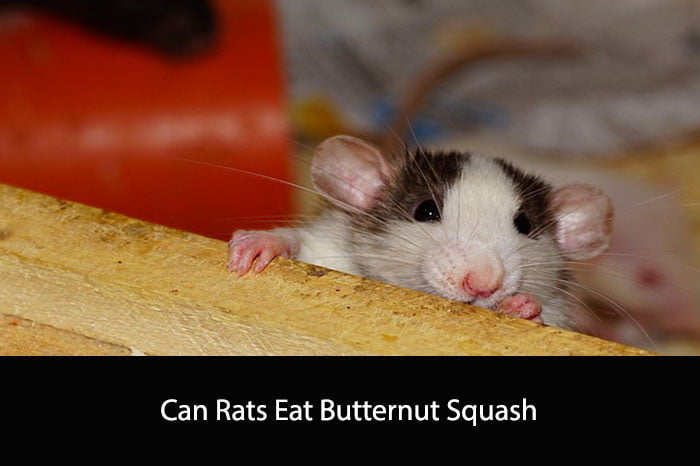Butternut squash is a nutrient-dense winter squash that is a popular ingredient in many human foods Its sweet, nutty flavor and soft texture when cooked make it a tasty addition to soups, casseroles, breads, and more But is this veggie safe and healthy for rats to eat as well?
Is Butternut Squash Safe for Rats?
Yes, butternut squash is safe for rats to eat. In fact, it provides some excellent nutritional benefits
-
High in vitamins A and C, providing antioxidants.
-
Good source of B vitamins like niacin, riboflavin, and folate.
-
Contains minerals like potassium, magnesium, and manganese.
-
High in fiber to support digestive health.
-
Low in fat and calories.
So in moderate amounts, incorporating cooked or raw butternut squash into your rat’s diet can provide valuable vitamins, minerals, and fiber.
Is Raw or Cooked Butternut Squash Better for Rats?
Butternut squash can be fed to rats raw or cooked. Most rat care guides recommend cooking it, for a few reasons:
-
The natural sugars are easier to digest when cooked.
-
Raw squash is very hard and rats may have trouble chewing it.
-
Cooking softens the flesh and brings out the sweet flavor.
However, some rats may enjoy the crunch of raw butternut squash and still get nutritional benefits from it. If you want to offer it raw, make sure to grate or finely chop it into small pieces so it is easy for your rats to eat.
For the most part, cooked butternut squash is ideal for rats. Try baking, steaming, or sautéing it. Mix in a bit of cinnamon, ginger, or nutmeg to make it extra enticing. The cooking process breaks down the fibers so it’s softer for your rats to eat and digest.
How Often Can Rats Eat Butternut Squash?
Butternut squash is safe to feed rats, but in moderation. As it is high in natural sugars and carbohydrates, it should be limited to occasional treats, about 1-2 times per week.
Feed small portions of butternut squash along with your rat’s regular balanced diet. About 1-2 tbsp per rat is a good serving size. Avoid giving too much as overfeeding high-carb foods can lead to obesity and diabetes in rats.
Rotate butternut squash with other vegetables and fruits to provide variety. Some other healthy options to mix in include:
- Sweet potatoes
- Bell peppers
- Broccoli
- Carrots
- Apples
- Blueberries
- Bananas
For a well-balanced diet, vegetables, fruits, proteins, grains, and fiber should all be included. A diverse, moderated diet will keep your rats healthy and happy.
Tips for Serving Butternut Squash to Rats
Here are some tips for safely incorporating butternut squash into your rat’s menu:
-
Steam or bake butternut squash until very soft, then mash or puree to prevent choking hazards.
-
Chop raw squash into tiny pea-sized pieces if offering it uncooked.
-
Mix a small amount of squash into their regular food instead of offering it alone.
-
Avoid adding sugar, butter, or other unhealthy toppings meant for humans.
-
Refrigerate leftover cooked squash within 2 hours and use within 3-5 days to prevent spoilage.
-
Introduce new foods like squash gradually in case it upsets your rat’s stomach.
-
Make sure squash does not make up more than 10% of your rat’s overall diet.
With its stellar nutrition profile and sweet, creamy taste and texture when cooked, butternut squash makes an excellent occasional treat for pet rats. Offer it cooked for the most benefits, and in moderate portions. Pair with their nutritionally balanced main diet for a tasty, healthy addition.
Can Rats Eat Meat? (Chicken, Beef, Fish, Turkey & Processed Meats) | Safe Rat Diet Guide
FAQ
What animals eat butternut squash?
What vegetables are safe for rats?
Can hamsters eat butternut squash?
Can rodents have squash?
Can rats eat squash?
Butternut squash. Make sure that the squash is thoroughly cooked before feeding it to your rat. Safe foods for rats include grapes, carrots, and cucumbers. Celery. This vegetable is fine for rats, but it doesn’t have very much nutritional value. Cheese. Small amounts are okay for rats. Soy-based cheese is healthier for them. Chicken.
Are there any health risks to eating Butternut squash?
Butternut squash is a healthy vegetable. However the potassium content may be a reason for some people to limit the amount they eat. Individuals who are taking beta blocker medication need to be aware of the high potassium foods they eat. Those on diuretics should also limit their intake. People with kidney disease should watch how much butternut squash and other high potassium foods they are eating to avoid hyperkalaemia or too much potassium in the blood.
Can rats eat nuts?
Nuts should be unsalted and unseasoned. Smaller foods such as pine nuts and pumpkin seeds make great treats for training and games. Seed, as nuts, should be unsalted and unseasoned. Adding dry or fresh culinary herbs to your rats’ regular diet is an excellent way of adding extra nutrition and variety. Herbs are also great for foraging.
What fruits & vegetables can rats eat?
With extensive knowledge of diet, care, and medication, she helps Misfit Animals provide readers with accurate knowledge on technical topics. Safe fruits and vegetables for rats include apples, bananas, cucumbers, zucchini, pears, carrots, cooked potatoes, peas, and more.

